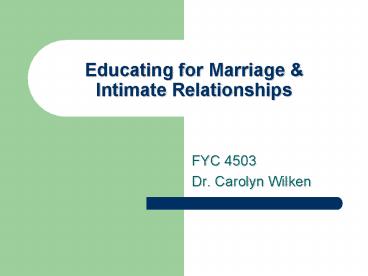Educating for Marriage - PowerPoint PPT Presentation
1 / 30
Title:
Educating for Marriage
Description:
Changing roles of women. Widely different cultural backgrounds of partners ... Discipline. Extended families. Finances ... Deferring to husband's needs over wives ... – PowerPoint PPT presentation
Number of Views:107
Avg rating:3.0/5.0
Title: Educating for Marriage
1
Educating for Marriage Intimate Relationships
- FYC 4503
- Dr. Carolyn Wilken
2
Marriage Intimate Relationships
- Couplingthe most complex of relationships
3
Current Challenges for Couples
- Changing roles of women
- Widely different cultural backgrounds of partners
- Physical distance from families of origin
4
Compatibility Models of Coupling
- Similarity
- Complimentary
- Sequential Filter
5
Similarity
- Based on the concept of matching birds of a
feather flock together - Similarities in
- Personality
- Values
- Roles
- Age
- Race
- Religion
- Didnt hold up to research!
6
Complimentary
- Opposites attract.
- You fill up my spaces
- Didnt hold up to research!
7
Sequential Filter
- Conduct different comparisons at different stages
of couple development - Social similarity
- Values similarity
- Personality similarity
- Didnt hold up to research!
8
Social Exchange Models
- Relationships based on satisfactory exchange of
rewards and costs between partners - Equity Models
- Investment Models
9
Equity Model
- Couple formed when expectation of reciprocal
rewards
10
Investment Model
- Steady increase in rewards over time
- Popular model of long-term marriages
- Put in too much to get out now
11
Interpersonal Process Model
- Combination of compatibility and social exchange
- Interpersonal processes occur between partners
- Interaction between partners and their networks
- Intra-psychic factors
- Circumstantial or environmental factors
12
Factors of High Risk Marriages
- Previous marriage
- Divorced parents
- Premarital cohabitation
- Premarital child bearing
13
Areas of Highest Conflict in Marriage
- Communication
- Sexuality
- Dispositional characteristics
- Communication
14
Happy Couples
- Talk more
- Spend time together
- Less time in conflict
- Exchange more rewards
- More humor
- Fewer punishments
15
Stages of Breakup
- Intra-psychic
- Dyadic
- Social
- Grave dressing
16
Purpose of Marriage Preparation
- Enhance communication skills
- Develop friendship with each other
- Commitment to the relationship
- Develop couple intimacy
- Develop problems solving skills
17
Components of Marriage Preparation
- Information
- Develop skills
- Explore values and attitudes
18
Developmental Stages Marriage Preparation
- High School
- Knowledge of relationships
- Skill building
- College
- Text books and lectures
- Community education/Extension
- Less structured and academic
- Current and applied
19
Pre-Marital Counseling
- Identified couples
- Often religious based
- Educative counseling
- Focus on
- Commitment to growth as individuals and partners
- Effective communication
- Conflict resolution skills
20
16 Topics for Pre-Marital Counseling
- Marriage as commitment
- Family of origin and individual backgrounds
- Temperaments and personalities of partners
- Communication skills
- Couple interaction patterns
- Roles in marriage
- Conflict resolution skills
- Decision making skills
- Financial resources and management skills
- Recreational interests
- Education, work goals and expectations
- Sexuality and affection
- Children and parenting
- Religious/spiritual values
- Relationship strengths
- Wedding plans
21
Groups Counseling
- Advantages
- Economic
- Work with more people
- Set realistic goals
- Interact and observe other couples
- Disadvantages
- Dominance of specific group members
- Note enough time for individuals
- Less disclosure
22
Format of Group Sessions
- Provide specific relationship information early
- Use small group discussion not lecture
- Avoid one-shot programs
- Schedule 3-6 months before wedding
- Help couples assess their progress
23
Advantages of Private Couples Classes
- See as individuals and as a couple
- Can observe couple interaction
- Emphasize bilateralism of relationships
- Keeps discussions out in open
24
Marriage Enrichment
- Marriage Encounter (Catholic)
- Marriage Enrichment (Quaker)
- Leadership Training (Methodists)
25
Components of Marriage Enrichment Programs
- Dynamic, experiential, educational preventive
- Promote balance between relational and individual
growth - Ongoing
- Focus on positive aspects of relationship
- Emphasizes communication
26
Divorce Education
- Focus on ending the relationship
- Improve adjustment to new roles status
- Enhance autonomy
- Problem solving skills
27
No Divorce Education Until.
- Key issues of survival have been resolved
- Food
- Financial issues
- Housing
- Child care
28
Re-Marriage
- 2/3 marriages end in divorce
- 40 American marriages are re-marriages
- 25 more re-marriages end up in divorce
29
Challenges of Re-Marriage
- Create unique family style
- Combining 2 families (or more)
- Solidifying marital relationship
- Step-Parenting
- Discipline
- Extended families
- Finances
30
Reported Biases of Family Life
Educators Impact Programs WHY?
- Assume that for women being married better than
NOT being married - Show less interest in womens careers than in
mens careers - Perpetuating belief that childrearing is womans
responsibility - Deferring to husbands needs over wives































